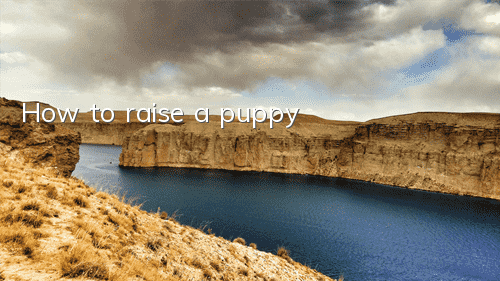It is more difficult for puppies to suck milk. You can buy a syringe, pull out the needle and just use the plastic part. Puppies have difficulty digesting milk. Just buy a bag of cheap baby milk powder, it doesn’t need to be expensive, or goat milk powder, one bag can last the puppy until he is one month old.
When feeding, insert the syringe into the puppy's mouth. Be careful not to choke. Feed once every four hours. Now that the puppy can suck, it will be more convenient to buy a smaller baby pacifier that can be put on the drink bottle, and it will save a lot of trouble than using a needle.
After a month, when the milk powder is almost gone, wean the puppy. If dog food is available, gradually add dog food to its milk, soak it until it is soft, and feed it to him. Instead of eating dog food, just feed porridge, just rice porridge, with a little bit of mashed ham in it, which puppies especially like to eat.
The puppy is too young to urinate and defecate. Now you need to moisten a paper towel or cotton cloth with warm water and gently wipe his back. Be patient. Puppies need enough stimulation to defecate and defecate. You should stimulate them after each feeding.
If you don’t have a bowel movement within two days, go to the drugstore to buy some Kaiseilu, and wrap a thin layer of cotton on the toothpick. About one-third of it is enough. Wrap more at the tip to make sure it is fully covered with Kaiseilu. Lubricate enough and defecate the puppy from behind, be sure to do it slowly and not to hurt the puppy.
Observe whether there are white granular objects in his poop. If so, it may be that your milk powder is too thick. Adjust the measurement. But don't rely on Kailu, just stimulate the puppy's poop regularly. Urination should occur before and after every feeding, and defecation once every two days is considered normal.
A newborn puppy has no hearing or vision for the first ten days, and relies on its sense of smell to recognize everything in the world. It will smell everywhere when it is hungry, and it will smell everywhere when it wants to urinate and defecate. Newborn puppies must be kept warm and not frozen. The puppy's eyes will slowly open in about two weeks, and its ears will also slowly open. After three weeks or more, he will be able to stand on his own. Exercise him and walk for a while every day, but you must always be careful not to tire the puppy.
After one month, you can choose puppy dog food that is good in palatability and easy to digest. It is recommended that you use puppy food mixed with milk powder for the puppy. Remember not to feed milk as it is prone to diarrhea. You can choose goat milk or better goat milk powder, which is carefully developed according to the unique nutritional needs of puppies. It supplements a variety of nutrients so that the dog can perform well in terms of intestines, bones, fur, physical fitness, and intellectual development. Delicious and nutritious.
Puppies eat 4 meals a day, 3 to 4 taels a day, and eating about 1 tael per meal is about the same. It is more beneficial to the body to eat less and more meals. If it eats until it can’t eat anymore, it does not mean it is full. Instead, overeating is not good for the digestive system.
After three months, you can feed the puppies dry dog food. Remember to put clean drinking water for the puppies to drink at any time.
In addition, puppies should also remember to be vaccinated. Puppies over 6 weeks old must be vaccinated three times:
The first injection of the puppy vaccine at 6 weeks of age;
The second injection of canine six-part vaccine when puppies are 8-9 weeks old;
For the third time, puppies are injected with canine six-part vaccine at 12 weeks of age.








